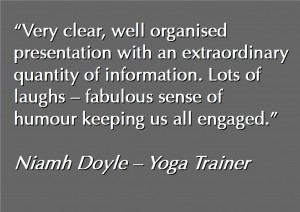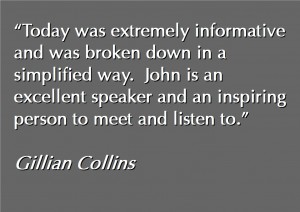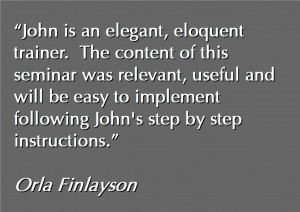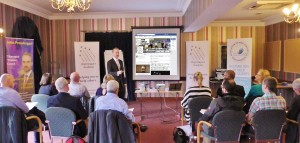John is available to speak on a wide range of topics relating to Mental Health, Happiness and Success, and Personal and Business Development.
John Prendergast is an Anxiety and Psycho-Trauma Therapist specialising in helping other Therapists get their help to those in need. In an age of Recession he has built a successful business in the Wellness sector and focusses much of his energy passing on all the knowledge gained from tracking and trialling strategies he has used to be booked-out Therapist with a waiting list.
After overcoming decades of Anxiety and Depression, and with a background in global Sales and Marketing, he trained internationally with leaders in the field of personal change including Paul McKenna, Dr. Richard Bandler, Andy Harrington and Brendon Burchard. He brings his considerable expertise to bear teaching Therapists, Coaches and Trainers to achieve their goals, reach more clients and help more people.
He has designed and delivered Seminars in conju anction with the IINLP, Accomplish Change Clinics, The Dancing Soul Therapy Centre, ICHP Graduate Association as well as independently. He has also crafted in-depth online courses on a range of subjects to further help Therapists and Coaches to build their businesses and connect with more clients. His credentials include: Licensed Trainer of NLP, Business, Marketing and Performance Coach and founder of Therapy and Coaching Success.
An entertaining and energetic Speaker, he engages fully with his audience in order to deliver his unique message and training. His well-researched presentations are aimed both at Professionals and Organisations.
The following are John’s Keynote Topics:
How to reduce Stress and Optimise Success.
Stress is a word we all know, but spotting it as it grows is not that simple. Usually we become aware of stress as it nears breaking point. We feel overwhelmed, pressured, become snappy and irritable, may be getting headaches, have poor sleep, and our minds can race, and we achieve less while feeling busier.
Understanding the systems of the mind and body around stress can allow us to spot it earlier as it builds and to change that reaction, increasing productivity, allowing us to enjoy life and work more, and increasing health and well-being.
- Spotting stress building
- Understanding the biological systems involved
- Techniques to reduce stress
- Surprise benefits of greater control of your stress
5 Steps to massively increase your Efficiency
Most people are always busy but yet they feel they are not achieving much when they look back on a week, month, or year. Simple strategies used by efficiency experts and highly successful people, show just how we can all improve our productivity while working less hours – letting us get more done and have more time off.
Many modern ways of working deplete neural energy, misdirect our concentration, and impede good planning and implementation of your time budgets. Understanding these gives us huge control over how much more we can get done in less time devoted to the task.
- The pitfalls & the neurology behind them

- Systems that allow us to see and control our time
- Best practice to structure our schedule for success
- Top tips to achieve more, reliably and regularly
Psychology of Social Media Marketing
Most social media advice is generic and thus wrong for many types of business. Added to that, the focus for many people is the technology. Facebook, Twitter, LinkedIn, YouTube, Pinterest, etc. are all tools to one end – connecting billions of human minds to each other and to information.
Social Media is Psychology more than technology, and those who forget this are fighting an uphill battle. Changing the psychology behind a campaign can change it from failing to returning up to 87 to 1 in some cases. The psychology around your objective is the most important aspect of a good campaign.
- Identifying the psychological triggers for your audience

- Creating an approach that helps the customer choose you
- The psychology of connection
- Developing and maintaining effective campaigns
Building Sustainable Change
Most change is created in a way that yields temporary results. We all see the sudden change that fades quickly. It’s easy to start but harder to keep going. Neuroscience in recent years, has shown us a lot about how the brain creates and sustains motivation. Applying simple strategies that take account of our biology allows us to do much better.
Systems that create reward on a neural level and which work hand in hand with our minds natural ways of operation, can allow us to create long-term sustainable success.
- Why most change falls back into past patterns

- The neuroscience of motivation and continuance
- The systems that are involved in the mind
- The strategies to avoid the pitfalls and use nature to help us
The Journey from Anxiety and Depression to Success, and what we can all learn from it.
Having overcome three and a half decades of anxiety and depression in his own life and having helped hundreds of others with anxiety & depression, John has seen many changes in his own life and in that of his clients. The parallels are astounding, both in how we all operate, as well as how organisations can follow the same patterns of error and sabotage a mind laden with anxiety.
His powerful story and insight translates into a series of strategies that show opportunity and support positive change on many levels.
- What we don’t notice building does more harm
- Acceptance of a problem can prolong it
- Common strategies that create the space for change
- Hope and motivation are needed in institutional change as much as personal change
Click the link below to download all the above information in a pdf document.


